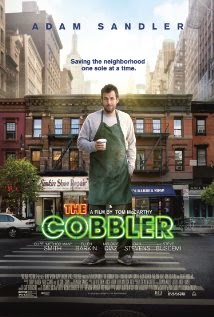The Cobbler is a frustratingly awful film, and not just because it describes itself as
“magical realism” but only uses that type of storytelling to have its
protagonist pretend to be other people so he can con women into having sex with
him, steal cars, and generally be an idiot.
There are also so many cultural and racial stereotypes,
so much poor dialogue, and such an awful final-act reveal that
works its hardest to undo much of the character and plot development that came
beforehand. How did this film gather a cast with the likes of Ellen Barkin and
Dustin Hoffman? What happened?
The film from
Thomas McCarthy, who directed and co-wrote the movie and is following up the
fantastically cloying Million Dollar Arm, is about Max (Adam Sandler) the
cobbler, running a shoe-repair store that has been in his family for
generations. Practically everything about his life is monotonous: it’s the same
kind of work every day and the same routine at home every day as he takes care
of his elderly, increasingly senile mother. The Lower East Side neighborhood he
works in, with its various trade shops, is changing around him as working-class
people sell and upper-class people move in, but Max isn’t as angry about that
as pretty young activist Carmen (Melonie Diaz). She sees rich people as
changing the dynamics of the city, but Max sees the money as an
opportunity—maybe he could sell the store and finally leave this place, with
its memories of his father who abandoned the family years ago, behind.
Until one day when
Max, in a shock, learns that the old shoe-repair machine hidden away in the
basement of the store doesn’t just work well after all these years—it also
transforms Max into the person who owned the shoes that he mended using the
machine. When he slips on a pair of expensive loafers, he turns into the
gangster Ludlow (Method Man, of “Red Tails”). When he slips on a pair of red
high heels, he becomes the drag queen who owns them; another pair of shoes
turns him into a chubby, quiet black teenager; another pair of shoes turns him
into a Chinese man with an accent (which, of course, is joked about); another
pair turns him into the owner of an expensive sportscar. Max can become anyone
he wants—and since he so thoroughly doesn’t want to be himself, this seems like
a fantastic fantasy come to life.
Except for where
reality catches up to him, most spectacularly when he decides to rip off Ludlow
while impersonating him—a decision that puts him into contact with Ludlow’s
abused girlfriend, various henchmen, a man he was torturing, and his shady
employer (Barkin), who hires Ludlow to assassinate someone. Caught in an
intensifying world of crime for which he is thoroughly unprepared, Max feels
the situation slipping out of control—and when tragedy strikes close to home,
things only get worse.
The idea of a
magical-realism film is an interesting one, not only because I’m a sucker for
that subgenre of literature but also because it would be such a departure for
Sandler at this point, and any change for his career would be a welcome one.
And yet The Cobbler can never seem
to get it together; it’s too mired in a cliched narrative—you’ll appreciate your own life once
you experience other people’s, who knew!—and too reliant on cheap gags and
racist humor. Why is it that every time Max commits a crime, he’s transformed
into a black person? Why are his lies to get women into bed not treated as the
despicable acts they are? Why does he get away with an impressively terrible
series of crimes and remains our hero, whereas Ludlow is on a similar level of
badness but is treated like the worst gangster alive? To call the movie’s
racial dynamics “complicated” would be letting it off way easier than it
deserves.
Aside from the double
standards with how it treats its characters, the film also traffics in too-tidy
explanations for its magic and its family dynamics, with a third-act reveal
that reveals Max as the “guardian of soles” (and “souls,” too, get it?!), and
therefore worthy and deserving of great things. Really? The Cobbler just makes him seem like a sad sack who can’t get his
life together and who gets rewarded for stealing other people’s identities in
order to get what he wants, but doesn’t want to work for. And yet in the
universe of this movie, that makes you a superhero. Ugh.
Rating: 0.5 out of 5 Guttenbergs
















